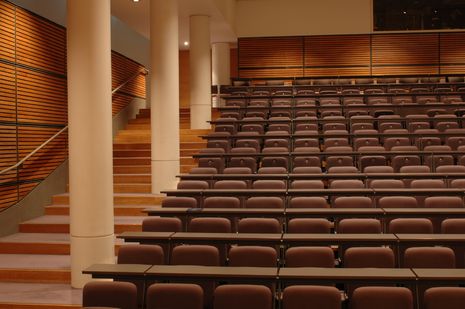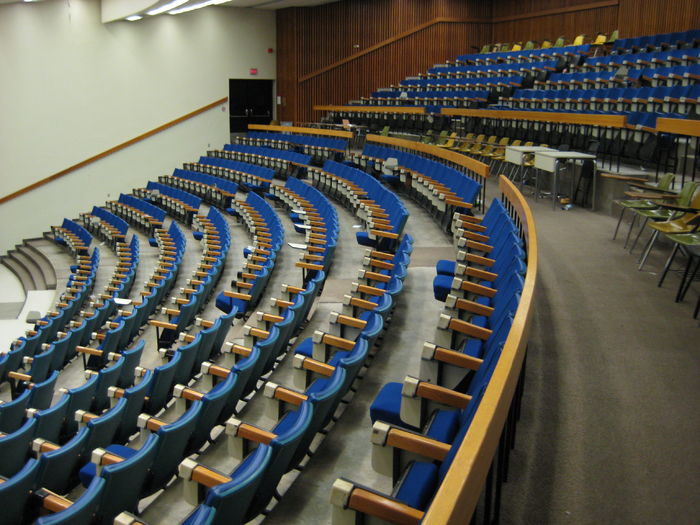Online learning: University staff report on digital move
Although many faculties describe adjusting well to online teaching provision, questions remain around perceived ‘regressive implications’ of the University’s response

As the University plans for lectures to be provided in an online-only format in the next academic year, Varsity spoke with faculties across the University to find out what issues had emerged in adapting to the new online format.
Whilst students have highlighted the technical issues and time-zone difficulties resulting from this term’s online learning, the digital move has also meant extra demands for members of staff.
“It can take several hours’ work to record a one-hour lecture”
Online teaching has for instance created difficulties in relation to child-care responsibilities. The Department of Engineering reported that “having to find a quiet space within which to be able to work” was the biggest issue reported by staff members.
Lecturers have also had to adjust to recording their lectures. Ann Copestake, Head of the Department of Computer Science and Technology, said: “the main issue for lecturers has been the amount of time it takes to prepare the videos – it can take several hours’ work to record a one-hour lecture.”
Cambridge’s University and College Union branch (CUCU) have also reported similar concerns. One CUCU member described that recording a one-hour lecture can take up to five hours to produce, on top of an already large workload.
The Department of Engineering, although well prepared with many lectures already recorded before the lockdown, have had to equip staff “with the tools to be able to pre-record lectures either in whole, or in short blocks 15-20 minutes long”. This greater flexibility was said to have proved very helpful for lecturers with child-care responsibilities.
Supervisions were reported to have generally gone ahead successfully, excluding some connection issues. In Engineering: “Supervisions have worked well, in that although we are not physically present with our students, we have managed to keep to a regular schedule, interacting with zoom or MS Teams, using all sorts of technological solutions to be able to work through technical problems together, ranging from tablets, MS Whiteboard, webcams and visualisers”.
The Faculty of Music has faced unique issues with student performances.
Ian Cross, Director of the Centre for Music and Science, notes that “although software which can enable real-time collaborative performance exists, it is complex and rather hand-made (works pretty well for pairs of performers, but not so much beyond that), so we’re unable to use this at present for our student performers. And we can’t have live concert performances, which changes the feel of whatever can be managed online”.
Some staff members saw the initial move to online teaching as an adjustment. David Summers, Chair of the Biology Faculty Board, said “we were all learning to work in a completely different way” before admitting: “just a few weeks ago I had never even heard of Zoom!”.
“We have adapted better than I thought we would”
Despite these challenges, many departments felt that their staff have responded well to the steep learning curve which has been necessary for the online move. Cross feels that, “on the whole, we have adapted better than I thought we would, given the rate at which events unfolded.”
“Initially, availability of software for teaching was poor or patchy; this has improved significantly, as has the pool of knowledge around it”.
The move to online learning has even been beneficial in some areas. For example, Use of the Panopto platform in Engineering has meant that lecturers “have been available using Zoom to answer questions immediately after lectures have been streamed”.
The School of Clinical Medicine has conducted an early evaluation which found that students have “praised the quality of teaching and welcoming initiatives like ‘themed’ weeks.”
Music MPhil presentations were “well-attended and hugely enjoyable for all, perhaps better so than had we had to undertake this face-to-face”. Some Politics seminars were also reported as seeing higher rates of attendance than during an ordinary term.
Summers also suggests that “for the exams, having the majority of scripts typed rather than hand-written is going to make marking easier.”
University Support
Throughout this term, the University has provided various support for online learning. This includes developing the Cambridge Centre for Teaching and Learning (CCTL) “as the repository for guidance”. CCTL has also “held four Remote Teaching Clinic webinars to support staff adapting to remote teaching”.
Many departments report that the University has been integral in helping them prepare for the online term.
The University “is providing the overall framework and what to expect, which has been very clear [...] in Engineering, we regularly communicate with the centre about our plans and there is a healthy two-way dialogue which will ultimately benefit the students,” Dr Colm Durkan suggests.
The Faculty of Biology reported that “there has been a pretty steady flow of top-down information and assistance from the central administration and also from School level”.
Similarly, the Faculty of Music explained that: “what’s emerged is a quite flexible framework within which faculties and departments have freedom to teach and manage themselves in ways that are appropriate to their discipline and circumstances”.
“Regressive implications”
However, not all staff perceive online teaching to be positive. CUCU told Varsity that they were concerned by the ways in which online teaching could leave staff worse off. A CUCU spokesperson pointed to the move’s “regressive implications” , when tied together with the University’s existing financial model.
The spokesperson explained that “In a 2018 CUCU survey, almost 40% of respondents told us their hourly pay for supervisions fell below the Real Living Wage. Factor in some more time for online preparation – scanning resources, working out how to use Zoom or MS Teams, adjusting your pedagogy for online use – and that means even lower pay”.
This particularly affects PhD students as their status freelance supervisors means that they cannot access departmental Zoom accounts and are not paid for training sessions.
CUCU also highlighted a second “regressive” implication - that “higher workloads exacerbate existing inequalities”. A higher workload “for academic staff already struggling to juggle research, teaching, and life at home [...] risks squeezing out research altogether, with serious implications for their careers in a system so obsessed with measuring research outputs”.
CUCU proposed that the most frustrating element of the digital shift is that “instructions for online teaching have simply been handed down from on high. People involved in planning on a faculty level have told us of their frustration at being largely sidelined in these discussions; and there’s even less consultation further down the ladder”.
“Plenty of staff have ideas about what online teaching might look like, the ways we can reformulate our teaching to make the best of the current arrangements, but those ideas are met with little interest from the people at the top”.
Looking forward, CUCU asked: “how will the University alleviate the currently intolerable workload levels, at a time when it’s seriously considering extending its hiring freeze into next year? How will it assess and tackle the higher levels of inequality for female staff we’re likely to see?”.
Gender disparities in academic output during lockdown have been reported, with female academics said to be increasingly less likely to submit research publications.
The University has informed Varsity that it is currently compiling a report on staff experiences of online teaching in the Easter Term through the Teaching Resource survey.
 News / University Council rescinds University Centre membership20 February 2026
News / University Council rescinds University Centre membership20 February 2026 News / Hundreds of Cambridge academics demand vote on fate of vet course20 February 2026
News / Hundreds of Cambridge academics demand vote on fate of vet course20 February 2026 News / Judge Business School advisor resigns over Epstein and Andrew links18 February 2026
News / Judge Business School advisor resigns over Epstein and Andrew links18 February 2026 News / Union cancels event with Sri Lankan politician after Tamil societies express ‘profound outrage’20 February 2026
News / Union cancels event with Sri Lankan politician after Tamil societies express ‘profound outrage’20 February 2026 News / Caius students fail to pass Pride flag proposal20 February 2026
News / Caius students fail to pass Pride flag proposal20 February 2026










